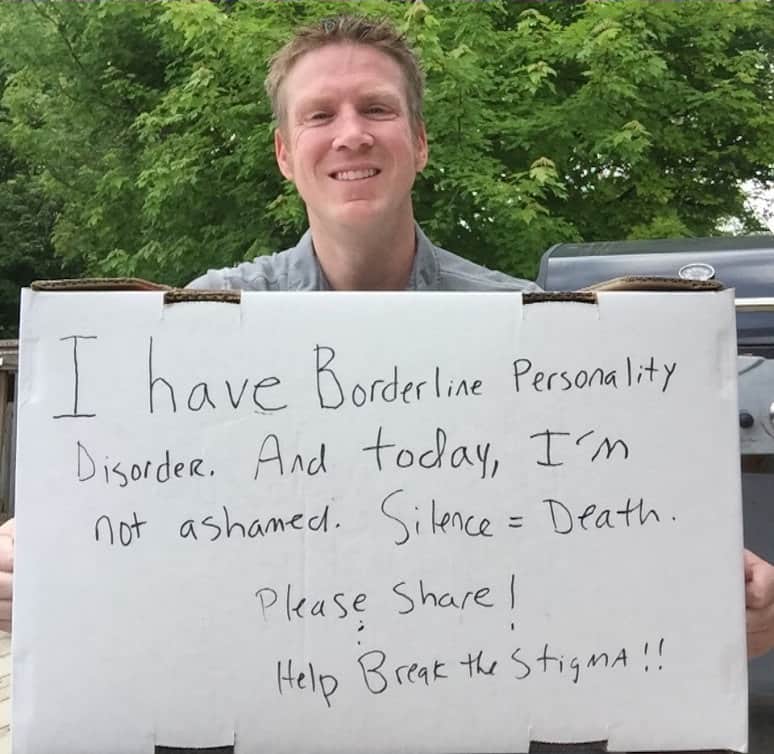by Ross Trowbridge.
My name is Ross Trowbridge. I have Borderline Personality Disorder and I am not ashamed. First off, I want to preface my article by saying that I once was. I have an emotional intensity disorder that causes instability in moods, impulsive decisions, inability to maintain interpersonal relationships, and more. But I haven’t always had this diagnosis.
I have been diagnosed and misdiagnosed with various conditions for over 20 years. It wasn’t that I didn’t want to get better. It was that I didn’t know HOW to get better. I lived with an undiagnosed, untreated, deadly condition that kills at least 10% – 15%+ of those afflicted at some point during their lifetime. By the time I was 18 years old, I was already 10 years into my condition and I was expected to live like a responsible adult. I was expected to make responsible decisions. I was expected to be like everyone else. Unfortunately, I could not live up to expectations.
I had substance abuse issues at a young age and relied on medications, 12 step programs and therapy to keep my head above water and find a way to manage my life. I was able to live a semi-functional life up until my mid 30’s. Although I really couldn’t hold a healthy interpersonal relationship, I was able to maintain a job, be a responsible and an active father, and blended into society. But I knew something was wrong with me. I knew that deep inside that I was not like other people. I knew I was not correctly diagnosed. I knew that the form of treatment I was utilizing was only putting a band-aid on a gushing wound.
At age 35, my life changed. I was finally diagnosed with Borderline Personality Disorder. I could finally connect the dots to why I did the things I did for so many years. I was able to understand why I felt the way I felt since I was an adolescent. I no longer felt alone. This was the start of my journey in no longer feeling ashamed. I hit some rough patches over the next couple years with times of stability but also experienced times of pure hell and anguish. At one point, I had a 5 month stretch where I was in bed 23 hours a day with daily suicidal ideation while holding onto life with all my might. I kept just a sliver of hope during that time that something would change. But I soon realized my circumstances didn’t need to change. I did.
I lacked the moment of revelation. But after 5 visits into the psych ward within a 2-year period, my revelation came. I had a moment of clarity and I haven’t looked back since. After searching a long period of time for adequate treatment for this disorder, I came to the realization that resources were limited and if I wanted to survive I needed to act. I needed to hold myself accountable for my previous, present and future mistakes. I needed to stop playing the mental health card and enabling my own illness. I needed to get off my butt and devote as much energy into recovery as I did keeping myself sick. All negative thoughts needed to be challenged. I couldn’t pick and choose which negative thoughts, I had to challenge them all. My brain had been conditioned to think a certain way since childhood and if I were to get well, I was required to reprogram that brain myself. I needed to find my formula to recovery. If I didn’t feel like my formula equated to the correct solution, then I needed to take out one or more of the variables and replace it with others until I found the answer. My variables within that formula must be evaluated daily and I make changes to it when necessary. I don’t believe in remission. I simply manage my disorder each day.
Today I have a very direct approach to my recovery. I make no excuses. I hold myself accountable. I practice many small, simple tasks that will give me a better chance of feeling true joy, peace and happiness. But I do believe that the most important variable within my formula is purpose. We have such a huge stigma placed on those afflicted with mental illness and there are not enough people out there who stand up for the mentally ill and advocate for their rights, reputation and wellbeing. I have a voice that matters, and I am doing my part to help stop the stigma within the mental health community.
I have recently launched a mental health initiative called #Project I Am Not Ashamed that brings the mental health community out to the streets to speak publicly about their experiences with mental illness. This is an opportunity for individuals who have been affected by mental illness to “out” themselves and come out of hiding while putting a face and name to the disorder they have. Individuals who have no mental illness but may know someone who has one is also encouraged to participate. As of March 6th, we are only 3 weeks into this project and have 10 US states, 26 cities and 4 countries that will represent the project on the day of the event on August 18th. We are also gaining media attention. You are more than welcome to check out this project via my website at borderlineinwaterl.wixsite.com/projectiamnotashamed.
In closing, my advice to anyone who is willing to take it is this.
- If you have a mental illness, do everything in your power to make sure it is the correct one. Do your research. Check into the criterion under the DSM V (the bible for the psychiatry world). If you feel that you are misdiagnosed, stand up for yourself and, if you must, go to another mental health professional who is receptive to your voice. If you don’t know what your true diagnosis is, you will never be able to fully manage your illness.
- Hang on. The only way to experience your revelation moment is to simply hang on and fight for your life.
- Find your formula. Evaluate your variables day to day and do everything you can in your power to find your solution.
- Find your purpose. Whatever that may be, it can change your life forever.
About the author: Ross Trowbridge has Borderline Personality Disorder and is not ashamed. Having mental illness most of his life, he speaks publicly about his struggles and successes through blogs, podcasts and the media to keep the conversation going about mental illness. His goal is to educate and inspire others and help stop the mental health stigma, one person at a time.
You can follow Ross on Twitter @bpdinwaterloo or email him at borderlineinwaterloo@gmail.com if you would like to participate in #Project I Am Not Ashamed on August 18th, 2018.




